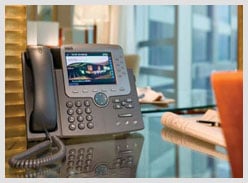 As a hotel manager or owner, you're constantly forced to make decisions that impact your business, its employees, and the visitors who frequent the hotel. Some of these decisions can have long-reaching consequences as to how your hotel is run on a daily basis. One such decision is the choice of upgrading your TDM (analog) PBX system to an IP-based setup. If you've been keeping up with recent trends, you'll see that many businesses, including hotels, are making the switch to take advantage of the benefits inherent with these new systems.
As a hotel manager or owner, you're constantly forced to make decisions that impact your business, its employees, and the visitors who frequent the hotel. Some of these decisions can have long-reaching consequences as to how your hotel is run on a daily basis. One such decision is the choice of upgrading your TDM (analog) PBX system to an IP-based setup. If you've been keeping up with recent trends, you'll see that many businesses, including hotels, are making the switch to take advantage of the benefits inherent with these new systems.
If that's the case, then why do so many hotels continue to utilize an analog system that is seen by many to be outdated? Could it be that hotel owners are afraid to make the switch? Is it possible that they're stuck in a bygone era? Or perhaps despite being older technology, Analog PBX continues to be relevant today.
For the most part, there are five primary reasons, which range from personal to professional, as to why Analog PBX is still relevant in hotels:
-
Track Record -- As the old adage goes, "if it ain't broke, don't fix it." While this may seem counterintuitive in business, it's somewhat hard to argue the switch to a new phone system when the current one has worked well for so many years. IP PBX has been around for a while now, and has made a lot of advancements over the years, but Analog PBX has a solid history that stretches back several decades. This track record offers proof to some hotel owners that there's simply no reason to change the status quo.
-
Familiarity -- Whether in your business or personal life, we're guessing that you like to use things that are familiar. Take the heated PC vs Mac battle, for example. If you had a nickel for every article that's been written as to why PC is better than Mac or Mac is better than PC, you'd be richer than Midas (and maybe even Scrooge McDuck). The point is, much of this comes from familiarity. Once you become accustomed to the way things work, you may come to believe that changing that familiarity could upset the natural order of things.
-
Plenty of Features -- While it's true that VOIP systems offer a number of benefits for businesses, the fact remains that Analog PBX has its own share of benefits that are more than enough for some hotels. Voice mail and auto attendant, for example, are two common features that businesses use on a regular basis. Analog PBX can also be set up to allow for call monitoring, call recording, and barge-in features. These extras may require more hardware or a mixed PBX, but they're still available much of the time.
-
Less Expensive Phones -- One of the biggest selling points of upgrading to VOIP is the lower cost of operation. This fact is absolutely true, and it can save businesses quite a bit of money, especially over several years. To be fair, however, it must be noted that the phones used in Analog PBX are less expensive than those used in an IP PBX system. Although this isn't a huge point, some hotel owners like the idea of cheaper hardware.
-
Compatibility -- Another reason why Analog PBX is still relevant in hotels is because you can integrate IP PBX with it. Not all of the features of IP PBX will be available, but this provides hotel owners with the flexibility of sticking with Analog while getting some of the advantages of VOIP. The setup can be a little tricky, but it's nothing that a quality PBX provider can't handle.
While Analog PBX has served the business world well and can still be relevant in hotels, the truth is that VOIP/IP PBX is the wave of the future. If you're on the fence and afraid to commit, a simple consultation with PhoneSuite can help put some of your fears to rest so that you can remain competitive.

